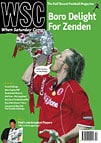 John Charles was arguably Wales's greatest ever sportman. Huw Richards remembers the career of a footballer who could have traded his boots for boxing gloves
John Charles was arguably Wales's greatest ever sportman. Huw Richards remembers the career of a footballer who could have traded his boots for boxing gloves
Last year John Charles said: “Only grandfathers remember me now.” How wrong he was was shown by well observed minutes’ of silence at venues as diverse as Kidderminster (playing his home town Swansea), Manchester United (v Leeds) and Bologna (v Juventus) and the tribute, moving in its unexpectedness, from Leeds’ extremely ungrandfatherly Alan Smith.
In truth he left a wealth of legend and anecdote. Juventus fans voting in 1997 elected him the greatest player of their first century, ahead of Platini and Zidane. Swansea folk memory still bitterly recalls his departure to Leeds in 1948, spirited from Swansea Town’s groundstaff in a manner that, while technically legal, led to a rapid change in FA regulations.
XWith Ivor Allchurch, Trevor Ford, Terry Medwin, Cliff Jones, Jack Kelsey and John’s brother Mel, he formed an astonishing postwar Swansea generation. Maybe, though, it was as well he went. Not yet an imposing figure, Charles was wing-half for Swansea reserves. The club captain doubted he would progress.
At Leeds he was converted into a centre-half – capped weeks after his 18th birthday – then a centre-forward who terrorised Division Two with 42 goals in 1953-54, then the top flight with 38 in 1956-57. He subverted the assumptions of footballing physics, that size is in inverse proportion to ball skills. At 6ft 2in and 14 stone he was a giant – add three inches and three stone for a modern comparison – with innate talent that led Danny Blanchflower to lament that while he had to think every action and movement, Charles knew them instinctively.
Then there was that pacific temperament, the despair of boxing promoters who saw in him a British challenger to Rocky Marciano, but origin of his Italian nickname, Il Buon Gigante. His attitude that “if I have to knock them down to play well, I don’t want to play this game” echoed the distaste for physical bullying of a similarly imposing Welsh contemporary, rugby league player Billy Boston. It may also have been the clue to their idolisation by communities very different from their own. Wigan, in adopting a black Cardiffian, and Turin recognised not only outsize sporting talent, but comparable largeness and generosity of spirit.
He broke a path for other Brits, although none has matched his success, equability of temperament and well proportioned ego – he knew his own greatness, but was not afflicted by a sense of entitlement. This as much as footballing gifts made him highly adaptable and the perfect foil for the mercurial Omar Sivori.
The Juve years were not without frustrations. Obtaining release for Wales was tough, late arrival one possible reason why he was outshone by Allchurch and brother Mel in the 1958 World Cup. But those five years – 93 goals, three titles, two cups (and three goals in the finals), leading scorer and player of the year in 1958, dominant figure in a vibrant, highly sophisticated culture – define his greatness.
The later years as player at Leeds, Roma and Cardiff, then player-manager at Hereford and Merthyr, assistant manager at Swansea, then businessman and publican, were less happy. His genial guilelessness made him ill-fitted for management or business. The money from Italy was lost in unsuccessful ventures.
Poverty, brushes with the law and ill-health should have made him the archetypal bitter ex-pro. Quite the opposite. Meeting him three years ago was memorable not just for encountering a living legend, but because of his unaffected warmth, a flow of highly entertaining anecdote and ungrudging appreciation of modern football and footballers.
We can, and will, debate whether he was Wales’s greatest sportsman – rugby’s Gareth Edwards and boxer Jimmy Wilde among formidable counter-claimants – or even its greatest footballer, with Billy Meredith, Ivor Allchurch and Ian Rush offering real alternatives. Few, of any nation, have left such warm memories, either sporting and personal.
From WSC 206 April 2004. What was happening this month